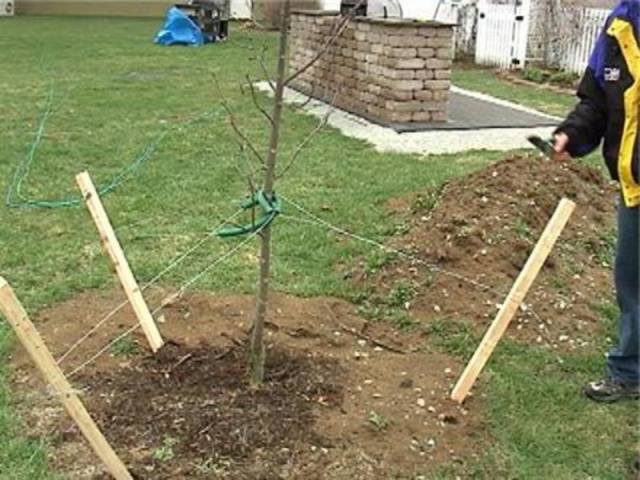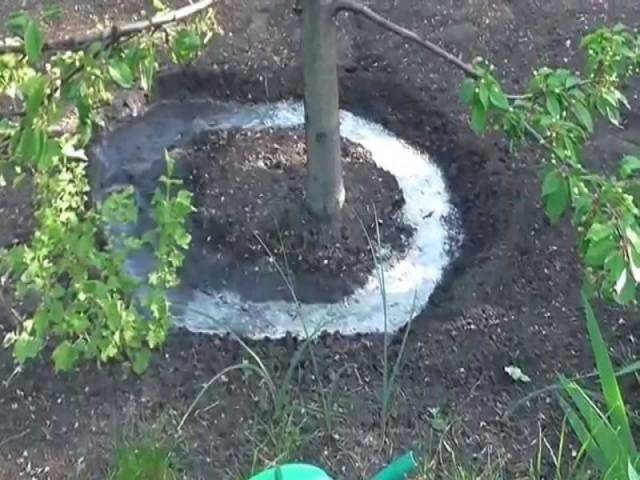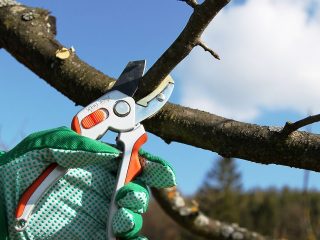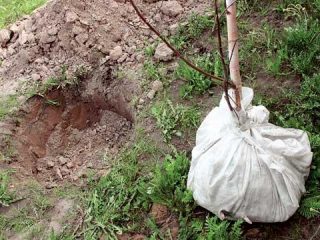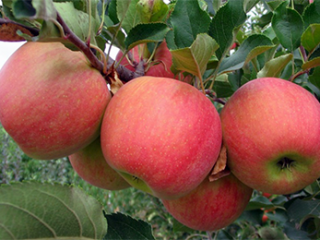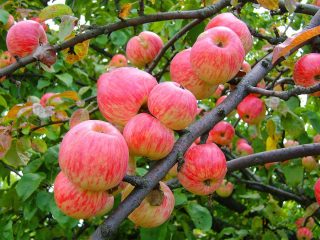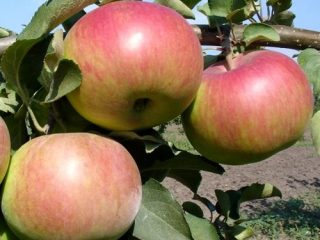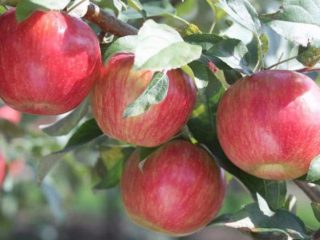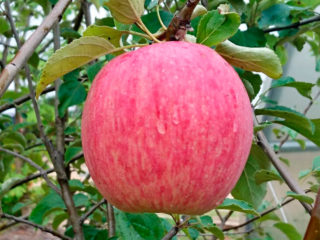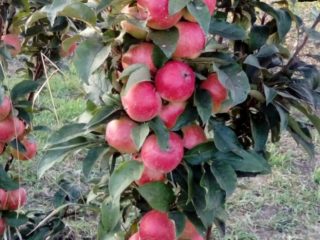Content
Gardeners take into account many factors when choosing varieties of apple trees for a plot: the ripening time and taste of apples, the height of the tree and the rules for caring for it, the frost resistance of apple trees and various other indicators. The Uslada apple tree variety has been chosen by many summer residents for their gardens due to its excellent characteristics.
This variety has proven itself well in the central regions of Russia, as it winters well and ripens in areas with rainy summer periods.
Description of the variety
The height of the tree does not exceed 3.5-4 meters. In young apple trees, the outline of the crown is closer to a round shape, and during the period of tree growth, the crown takes on an oval-elongated shape.
Fruits weighing 105-135 grams ripen with a round, slightly oval shape. With proper care, the apple gains weight up to 170 grams. Apples They have smooth and not very thick skin. The color of the fruit is greenish-yellow with a characteristic deep crimson tint in the form of a “blush”. The reddish tint may cover the entire surface of the apple or form wide stripes of a blurry red tone (as in the photo).
Apple pulp is most often white, but sometimes you come across fruits with pulp of a pale pinkish hue. Apples of the Uslada variety are dessert apples and have a rich, sour-sweet taste.Raspberry notes can be distinguished in the aroma of ripe fruits.
Uslada apples should be classified as universal varieties - the fruits are tasty fresh, excellent for canning, winter preparations and are well stored. A distinctive feature of the variety is that the characteristics of the apple are especially suitable for baby and dietary nutrition.
Advantages of the variety:
- excellent winter hardiness;
- early fruiting - the apple tree begins to bear fruit after 4-5 years;
- abundant annual harvest;
- elegant and appetizing appearance of apples;
- resistance to scab.
Some summer residents consider the heterogeneity of apples to be a disadvantage.
Moreover, the Uslada variety is considered a semi-dwarf tree and does not cause any hassle with pruning branches.
Recommendations for apple tree breeding and care
Probably all summer residents and gardeners will agree that the Uslada apple tree does not require special care and is grateful for periodic attention.
Apple tree planting
It is better to set aside spring time for planting Uslad seedlings. At the end of April the soil almost thawed. If the opportunity to plant Uslada appeared only in the fall, then it is advisable to start seedlings in September-early October. In this case, the apple tree will still be able to take root and take root before the cold period.
When planting Uslada, it is important to choose a suitable pollinator tree.
Trees of the same group, with a suitable flowering period, should be placed next to the Uslada apple tree.
The varieties President, Bogatyr, and Grushovka are optimally suited for cross-pollination of Uslada.
Delight apple trees do not grow luxuriously spreading. However, when planting a garden, it is necessary to provide a distance between individual apple trees of at least 4-5 meters. This measure will provide each tree with good lighting and ventilation. Before planting, preparatory work is carried out.
- It is recommended to select a place for planting Uslada seedlings in advance. A hole is dug a week before planting, approximately 70 cm deep.
- Humus and mineral fertilizers (superphosphate, a mixture of potassium and nitrogen fertilizers) are poured into the bottom of the pit. Be sure to pour a little soil on top and mix everything carefully.
- After a week, the apple tree is placed in a hole, the roots straightened, and covered with soil. Water generously to compact the soil in the hole. After 7-8 days, it is recommended to repeat abundant watering.
The best option is to drive two/three pegs along the edges of the hole and secure the seedling between them using ropes (as in the photo).
Chernozem, of course, is a universal soil for apple trees. But Uslada takes root well and bears fruit in various lands. A generous harvest is ensured with conscientious care, timely watering, periodic loosening of the soil and application of fertilizers.
Watering and fertilizing trees
Autumn feeding of the Uslada apple tree is carried out to preserve and ensure fertility. It is best to use organic fertilizers during this period - manure or droppings. If your dacha has a compost pit, you can fertilize it with compost at the rate of 8 kg per square meter.
In the spring, during the setting of buds and during the flowering period of Uslada, it is useful to fertilize the soil with a mineral composition. Complex fertilizers are applied when watering apple trees.
For proper watering, water must be poured into a special ditch (15-20 cm deep), designed around the apple tree in the form of a circle.
When carrying out irrigation work, it is important to take into account the topography of the site. On flat terrain, the furrows are usually leveled when loosening the soil. If the garden is laid out on a slope, then it is advisable to form a roller around the trunk of the apple tree or arrange a hole. Such measures will help retain moisture during artificial irrigation and during rains.
Water standards are determined by the age of the apple tree.
During dry periods, trees naturally need to be watered more often. This is especially important during flowering and apple setting. As a result of lack of moisture, part of the ovary may fall off, and the apples will not gain juice and will be small.
Apple tree pruning
A distinctive feature of the Uslada variety is that as the crown thickens, the apples begin to ripen in different sizes. To avoid such a problem, it is recommended to always trim unnecessary branches for this variety.
Spring is the best time to prune an apple tree. Sap flow has not yet begun and branches that are superfluous are visible.
When pruning, the crown is thinned out - branches that interfere with each other and thicken the tree in the summer are removed. The tops must be cut off. These are strong fattening shoots that take away the juices from the tree. They thicken the crown and never bear fruit. Pruning aged Uslada apple trees still has a rejuvenating value.
When pruning branches, the cut sites must be covered with garden varnish, which accelerates the healing of the branch, prevents the penetration of fungal diseases and stops the flow of juice from the cut.
Harvesting
The Uslada apple variety is an autumn variety. But you can start harvesting from the end of August or the beginning of September. As a rule, Uslada cuttings hold fruit well, so you don’t have to worry about the apples falling off. Ripe apples store well, but it is advisable to eat them within a month.
If you pick the fruit a little unripe, the apples can last until mid-winter. True, subject to storage conditions:
- It is advisable to place apples in well-ventilated containers;
- It is better to store boxes in a dark room, at an air temperature from +2˚ C to +5˚ C.
Careful care and timely thinning of the crown help increase the yield of the Uslada variety. And then from one mature tree you can collect approximately 80 kg of apples.
Apple tree diseases and pests
The Uslada apple tree is distinguished by its amazing resistance to scab, as well as to various pests and fungal diseases.
Gardeners do not take any special measures to protect the Uslada apple tree. But as a preventative measure, it is recommended to treat the apple tree with Bordeaux mixture in early spring. Spraying should be done before the buds break.
Thanks to its unpretentiousness and endurance, such an apple tree can decorate even a novice gardener’s garden.



